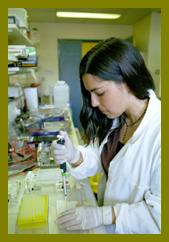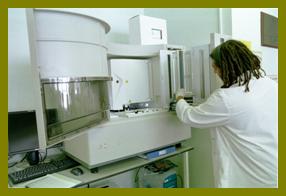|
Genes Talking at the |
 |
funded by
|
||
|
From Monday 4th July 2005, the ICA theatre will become the unique site for a groundbreaking, time-based installation, transforming into a live, working scientific laboratory. Volunteer scientists will conduct genuine experiments using DNA sequencing technology - used in the Human Genome Project - in the hope of isolating DNA responsible for specific language impairment (SLI), a disorder characterised by problems with verbal communication. |
|
|
|
The public will be able to see a real lab working on a day-to-day basis, talk to scientists, and take part in the analysis of the results. The experiment will analyse a ‘candidate gene’ for specific language impairment (SLI). Individuals with SLI have problems producing or understanding spoken language, despite normal intelligence. Characteristically they exhibit delayed onset of speech, perhaps not learning to talk until 3 or 4 years of age. SLI is distinct from dyslexia, which involves problems with written language, but is just as common in the population. |
||
 |
The project is the result of a collaboration between science–arts consultant, Dr Julie Webb, curator, the Institute of Contemporary Arts (ICA), Professor Anthony Monaco from the Wellcome Trust Centre for Human Genetics in Oxford, and Professor Mandy Fisher from the MRC Clinical Sciences Centre (MRC CSC). Visitors to Genes Talking can contribute to these experiments in the ICA’s Digital Studio. Data generated from the DNA sequencing reaction will be collected digitally, taking the form of a simple graph. Members of the public will be invited to read DNA sequences on the graph from people with SLI, and compare these to the normal sequences, noting any differences. A simple procedure of interpreting coloured peaks from a graph, corresponding to letters of the genetic alphabet. |
